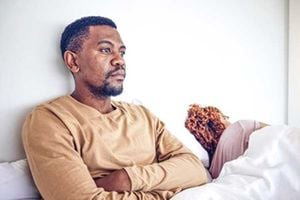
Does Kenya have a fatherhood crisis? Photo | Photosearch
Not to be dramatic but when I went under the knife and became a man, those droplets of blood had made me falsely believe I could do anything: skin a Maasai lion for leisure, drink beer ovyo ovyo, and hang out with girls who were probably the reason our elders said asiyefunzwa na mamaye hufunzwa na ulimwengu.
There was no cheat code to masculinity then, no National Youth Service for “discipline and order”; there were just grainy YouTube videos of “7 Steps to Grow Your Beard in Three Days [Number 4 is very important]”. I thought then that being a man is having a beard, something that screams “Man!”—and something that girls can stroke while I lie to them about that Maasai lion I skinned for leisure.
“Simba is back!” I’d say. But because a man needs a vice, I had to find one. Smoking was too tedious, and I did not want to sound like a pirate with stage four throat cancer, which is what anyone who smoked sounded like to me. Drinking was de rigueur, and therefore cliché. My mother’s prayers (and red slippers) have kept me away from hard drugs.
I cannot tell you my weakness because I don’t want to, and frankly, she is reading this. In all this, I came to the banal conclusion that manhood is a path, not a door. It is an affair of great and seductive beauty but also a nostalgic longing for something you can’t quite put your finger on, like some classic male experience, the way some women who didn’t have children worry they missed something basic about being a woman, something they didn’t value when they could have done it.
As you get older, you want to be alone a lot. At least, I do. I am not a father (yet) (or none that I have heard of). I am thinking constantly about whether I want children, the pressure gets ramped up when you are the first son, and firstborn. Which I am. I am not complaining, I am stating. I still feel like a child myself, and I have an unhealthy collection (read: obsession) with figurines and collectibles.
Someone’s daughter told me I am trying to relive my childhood, that I am such a baby, so I refused to eat her food. She doesn’t know me like I do. I am a plarent—plant parent—however, and my monstera and snake plant and two cacti are thriving. Present fatherhood. Be that as it may, I am coming to grips with mortality. The people I know are burying their parents, which means we are closer to the grave than to the cradle.
I don’t take any day for granted, at least not with this government in situ. In all this, I have trekked the treacherous path to manhood, in its windy trails and pebbled T-junctions. On this journey too, I have realised that perhaps I am not as young and golden anymore.
I am counting the zeros on my reality check: We will never become billionaires. Or marry into a family from Nyari. Which is probably the same thing. The childhood myths reveal themselves to be just that. The truth feels like an uppercut, a sucker-punch to the gut. The truth is I have gone to a great extent to avoid “masculinity experts” or anyone who claims they have the key to the wisdom of manhood.
And yes, I get the paradox of writing a Mantalk column. I treat male experts the same way I look at cockroaches: I scream “Ngai!” then encourage them to depart, with a shooing gesture. There are good things they say, of course, just to give the devil his due, but there are many problematic things, to remind you why the devil is hardly given his due. It is a specific aesthetic of masculine sadness.
It is to understand why young men continue to struggle even though the market is drowning from the flood of online advice. To them, it’s about success—with money, and women. We are focused on success ethics, not virtue ethics, that is why we call a politician who does not flaunt his largesse “humble”.
Virtues become a means to an end. Another truth? Men’s rate of workforce participation has fallen and their suicide rates have risen, despite the humdrum. We were taught to desire the intrinsic reward of achievement and respect and doing something worthwhile. I won’t argue with you if you call it a leftover of the noblesse oblige mentality.
To be a young man in modern-day Kenya is to be measured exclusively by the wealth you accrue for yourself—with a diffident middle finger to moral rectitude. When I was in high school, I long admired to be a teacher, because teachers were public intellectuals.
I posit that society has to make being a teacher or gardener of carpenter et al an intrinsically and extrinsically rewarding job. Forex traders, crypto overlords, wash wash merchants, tenderpreneurs, politicians…these are people who create nothing but unfortunately, have snared young men to orbit their star and worship them on their altar of “grass-to-grace” hogwash.
Where all that matters is winning, not how or why. But the “devil take the hindmost” just won’t cut it anymore. Lakini, ngoja. I have seen, on my masculinity path that even that success does not fill the hole in our hearts. The more stuff we accumulate, the emptier we feel. You can’t fill what you can’t feel. To use a medical term: Ngai! But manhood is a journey, and your possessions only serve as weights.
What accompanies you are your values and virtues—the things that actually matter: kindness, prudence, justice, love, courage, duty. We have been taught to be strong and stoic, but we can learn to be kind and empathetic too.
Masculinity is a path, and no matter how well I describe my journey for you, you can only walk your own. People much wiser than me said it better: it is the glory of a man to be on the move always, like the river; unlike the mountain whose majesty is in its stillness.










